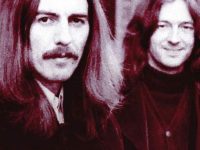One of the most complicated figures in rock history, John Lennon has proven notoriously difficult to capture in print or film. He famously contradicted himself in interviews, had complex relationships with women, and complicated friendships with fellow Beatles.
The last few years of Lennon’s life have been particularly difficult to pinpoint: Was he the “househusband” baking bread that he claimed, or was he locked in his bedroom, stoned and watching TV incessantly? Countless books have attempted to encompass his larger-than-life persona, but few have presented such a three-dimensional picture as Kenneth Womack’s new book John Lennon 80: The Last Days in the Life.
Leading readers on a journey from Lennon and Yoko Ono’s Dakota abode to his triumphant sailing trip to Bermuda to his rejuvenating Double Fantasy recording sessions, John Lennon 80 portrays an artist on a path to creative and personal rejuvenation. The story begins at the Dakota, where Lennon finds himself at a creative and personal crossroads. While he enjoys being a doting dad to Sean, he finds himself at a loss as to his place in music.
Womack largely dismisses the myth that Lennon was a complete recluse by 1978, as he could be found picking up prescriptions at the local pharmacy, sipping tea at Cafe La Fortuna, or having his hair styled at the nearby salon. But he was not exactly the happy househusband baking bread: Lennon had hit a creative dry spell, uninspired by current popular music. The road back to regaining his muse would prove long and difficult, yet Womack describes it with suspense and detail that will surprise even the most diehard Lennon fans.
Womack portrays John Lennon’s transformation through his demos, showing how they transformed from melancholy and despair to the more positive and forward-thinking compositions that would appear on Double Fantasy and Milk and Honey. A particularly fascinating example is “Emotional Wreck,” a demo Lennon first recorded in 1977 that transformed into the classic “Watching the Wheels.” It can be seen as an allegory for his life, as he gradually accepted the contradictions in his journey toward contentment.
John Lennon 80 also chronicles what turned out to be one of the defining moments of Lennon’s life: sailing to Bermuda on the Megan Jaye. When the yacht was hit with massive gale-force winds only 48 hours into the journey, most of the crew was hit with seasickness except for the captain and Lennon. The captain eventually had to rest, so he instructed the novice sailor to take over the reins. Kenneth Womack’s description of the rain pounding against Lennon’s body as he shouts sea shanties into the wind are indeed vivid. To everyone’s astonishment, Lennon handled the torrential conditions admirably. After that experience, Womack explains, Lennon felt rejuvenated creatively and personally.
Inspired by that experience, as well as Paul McCartney’s infectious 1980 hit “Coming Up,” Lennon quickly wrote the material that would comprise Double Fantasy. The joyous recording sessions under producer Jack Douglas demonstrate how enthusiastic Lennon was to be recording again. His determination to make Yoko Ono a major star — including the jubilant sessions for Ono’s single “Walking on Thin Ice” — prove touching.
At the same time, revelations that John Lennon had major plans — returning to the UK to visit family, touring to promote the album, recording a second album, even considering reuniting for a concert with the Beatles — makes the inevitable ending all the more heartbreaking. Kenneth Womack handles the gut-punching conclusion with sensitivity, omitting sensationalism and details readers have heard many times before.
Other books chronicling Lennon’s last years — his entire biography, in fact — have presented only one side of the singer’s complex personality. John Lennon 80: The Last Days in the Life provides the most three-dimensional picture yet of Lennon’s final years, illustrating how he tangled with his inner demons to produce what would become his final artistic statement.
Along with Ken Sharp’s Starting Over: The Making of John Lennon and Yoko Ono’s ‘Double Fantasy,’ Kenneth Womack’s John Lennon 80 paints a realistic, balanced picture of that all-too-short period of time: its setbacks, victories and, sadly, unfulfilled dreams.
- The Rescued Early Paul McCartney Song That Completed ‘Beatles For Sale’ - December 4, 2024
- A Rare Beatles Cover Proves John Lennon Was Wrong About His Voice - November 26, 2024
- How John Lennon Came Roaring Back on the Beatles’ White Album - November 22, 2023



